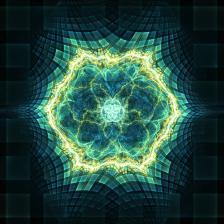Detangling Quantum Computers
Tech Talker teams up with Everyday Einstein to explain quantum computers — and tackle all those conspiracy theories you may have heard about their computing power.
Listen
Detangling Quantum Computers

But for our practical purposes, the main question is: How is a quantum computer different than your laptop or desktop?
Well, a normal computer uses bits (1’s and 0’s) which are generally stored on transistors. Normal computers use bits to execute code, store pictures, play music, check Facebook, and pretty much everything you can think of. Quantum computers store their information as qubits or quantum bits. Quantum bits are pretty tricky, because they can be a 0, or a 1, or both! This is called superposition.
This property allows for some pretty exciting things in the world of programming and mathematics. This third state that a qubit has is not observable. In fact when you do observe it, it turns into a 0 or a 1. Kind of like when you open the refrigerator door, the light always comes on. There’s no way to see the inside of the dark refrigerator..
Super-What?
Quantum computers use this breakdown of superposition to do some really interesting calculations that normal computers have a really hard time with.
For example it’s really hard for normal computers to find factors of prime numbers, and it just so happens that almost all cryptography uses some form of large prime numbers or one way functions to secure your data.
In fact you use this hundreds of times throughout your day as you log in and out of websites. If I were to try and break your password I would just have to guess a bunch of times until I got it. With a quantum computer, as the state of the superposition breaks down so does your password.
This could also affect the world of Bitcoin and other cryptographic technologies. Because what was once a hard problem to solve is now pretty simple to break into!
Now don’t worry just yet. There’s nothing publicly known that can break passwords in the blink of an eye! There are quantum computers that can only use a few qubits to do very simple computations. In the future though this may lead to some really interesting shifts in technology!
Now let’s chat with my friend Dr. Lee Falin, aka Everyday Einstein, to learn more about quantum computers……
Everyday Einstein: Superposition is one of the key principles behind the idea of quantum computing. A common object that we use as an example when we discuss superposition is the electron. Electrons have a property called spin, which can be either up or down. However according to the theory of quantum mechanics, not only can an electron spin up or down, it can also have a spin that is any linear combination of those two states. A linear combination means that is a little of the up state plus a little of the down state.
Normal computers use bits which can either be 1 or 0. So if you have an 8-bit computer, it can have 1 out of 2 to the 8th power (or 256) at any given time. A quantum computer taking advantage of superposition could be in all 256 of these states at the same time.
Where things get strange is that while one observer may see the electron with an up spin, another observer might see the electron with a down spin. The fact that these differences of measurement occur, even though both observers are looking at the electron at precisely the same moment, means that in quantum mechanics we consider the electron to have both of these spins at the same time. We call this property superposition.
This is important for quantum computing because as Tech Talker said, normal computers use a bit which can either be 1 or 0. So if you have an 8-bit computer, it can have 1 out of 2 to the 8th power (or 256) at any given time. However a quantum computer taking advantage of superposition could be in all 256 of these states at the same time. That means that for certain types of algorithms (though not all), quantum computers could cause an enormous increase in computing power.
Now because each of these qubits can exist in all of their states at the same time, you might wonder how you could use these things to store any information. In order to do so, we need to take advantage of another property of quantum theory called entanglement. Entanglement tells us that two particles can be connected in a way that if you measure the state of one particle you instantly know the state of the other particle as well, regardless of the distance between those two particles. This has several implications in quantum computing, but one of the most important is that it lets us entangle the qubits of our quantum computer together so that once we know the state of one, we can also know the state of all of the others.
If this all sounds a bit muddled, don’t worry. Even scientists that have been instrumental in the development of the field haven’t found it very intuitive. Niels Bohr said “…those who are not shocked when they first come across quantum theory cannot possibly have understood it.” And Richard Feynman said “I think I can safely say that nobody understands quantum mechanics.”
Thanks Lee – fascinating stuff!
So far the closest known form of a quantum computer is Google’s D-wave. This computer was purchased by Google to help perform calculations on certain tasks such as disease prevention and cures as well as climate modeling. Here’s an awesome video that explains how their computer works.
One thing to keep in mind is that this is not a true quantum computer. I won’t go into great detail, but essentially the D-wave is a cross between a normal super-computer and a quantum computer. The best way to put it is that the D-wave is an awesome super computer with some quantum characteristics.
There’s also a ton of rumors flying around about the government experimenting with the use of quantum computers. I’m sure there’s something in the works in a super secret facility. I’ve done a lot of research on the topic and at best every account of a fully functioning, high-powered quantum computer is a conspiracy theory.
Well, that’s it for today! Be sure to check out all my earlier episodes at techtalker.quickanddirtytips.com. And if you have further questions about this podcast or want to make a suggestion for a future episode, post them on Facebook QDTtechtalker.
Until next time, I’m the Tech Talker, keeping technology simple!

